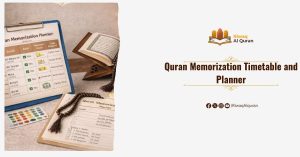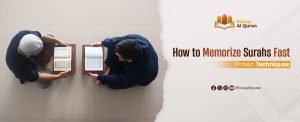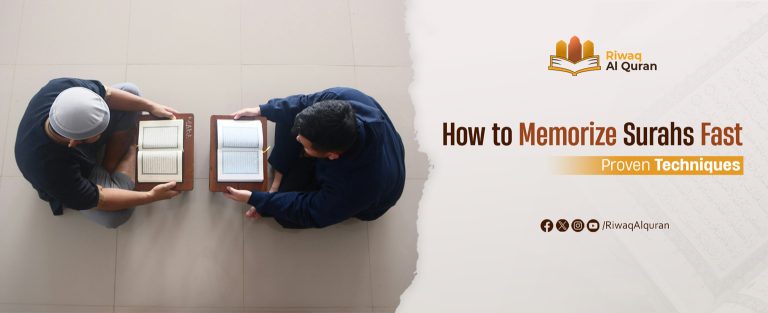The ideal age to start Hifz varies, but typically children begin around 5 or 6 years old. To make Quranic memorization enjoyable for young children, use engaging techniques like short sessions, repetition, visual aids, games, and consistent routines, with active parental involvement crucial for support and motivation.
Sometimes, when we set out on a path in the name of Allah, we worry about doing it in the right way and at the right time. This stems from our effort to serve Allah most beautifully. The life that has been given to us is a path and on this path, we have been given a guide, the Quran, thanks to Allah.
In our last blog, we briefly talked about how to Memorize the Quran for kids. For those who want to start memorization or want their child to become a hafiz, we have compiled our article about the best age to memorize Quran.
Table of Contents
The best age to memorize The Quran
The ideal age to start Hifz, or Quranic memorization, varies for each individual depending on their readiness and circumstances. Generally, children can begin memorizing the Quran as early as 5 or 6 years old, when they have developed basic reading skills and can grasp concepts more easily.
However, some children may start either earlier or later, depending on their maturity and ability to focus. It is essential to consider each child’s unique abilities and readiness when determining the appropriate age to begin Hifz. Ultimately, the decision should be made with the guidance of knowledgeable educators or scholars who can assess the child’s readiness and provide appropriate support throughout the memorization journey.
Is there An Age Limit for Quran Hifz?
There isn’t a strict age limit for Quranic memorization (Hifz). People of all ages, from children to adults, can undertake the journey of memorizing the Quran. However, starting at a younger age is often encouraged, as children tend to have better memory retention and are more adept at learning new languages. Additionally, younger individuals have more time to dedicate to memorization and can potentially complete the task more quickly.
That said, adults can also successfully memorize the Quran with dedication, perseverance, and consistent effort. The process may take longer due to other responsibilities and commitments adults may have, but it is certainly achievable.
Ultimately, the decision to embark on the journey of Quranic memorization and the pace at which it is pursued depends on individual circumstances, capabilities, and personal goals. What matters most is the sincerity of intention and the commitment to consistently engage in memorization efforts, regardless of age.
What Does Science Say about the Best Age to Start Memorizing?
Although there are different opinions about the best age to memorize Quran and what the starting age should be, it is generally accepted that starting at an early age is important for the quality of education. According to some scientists, the most appropriate age for memorization is the age range of 6-15.
In consonance with the research, it has been determined that the motivation status of the individuals who take Quran memorization lessons is affected by the age factor, in other words, there is a significant difference in motivation between the individuals who start their hifdh process at an early age and those who start at an advanced age.
A previous examination on Quran memorization in early childhood showed the memory increased after listening to the reading of the Quran for 15 minutes. In addition to the fact that memorization can be done more efficiently at an early age, we see that it is also beneficial for the development process of the brain.
While the absorption lowers in rate beyond ages 40-50 due to degenerative processes, the central nervous system of youngsters accepts and absorbs information in a faster way. The main reason for this situation is the speed of protein synthesis. This indicates the stability of long-lasting memory.
Can A Child Begin Memorizing the Quran Before the Age of Six?
Yes, it’s possible for children to begin memorizing the Quran before six. Parents often want their children to become Hafiz early to shape their morals and habits according to the Quran.
The process should match the child’s capacity and not overwhelm them. Observing the child’s abilities and consulting a competent educator are essential to determine if they are ready for memorization.
Hifdh can be postponed or not started at all if it does not suit the child’s abilities, development, and nature. Because the age we mentioned is before 6 years old. Therefore, if the child’s cognitive and mental development is not suitable for hifdh, the child should not be forced to do that. Also, it is of great importance to learn how to make Quran memorization for kids fun and enjoyable.
Youngest Person to Memorize the Quran
The exact record for the youngest person to memorize the Quran isn’t universally documented because record-keeping and verification processes vary between regions and communities. Nonetheless, there have been instances where children as young as five have successfully memorized the entire Quran.
These extraordinary accomplishments typically happen in environments that prioritize Quranic education and memorization from an early age. Although specific records might not be easily accessible, such examples are amazingly inspiring, highlighting both the dedication and talent of these individuals and the supportive communities that foster their Quranic knowledge.
Here is a detailed guide on how to memorize Quran in 1 year!
Experience Riwaq Al Quran Classes
Watch real moments from our live sessions at Riwaq Al Quran and see how we bring learning to life. These clips highlight our interactive, student-focused approach designed to keep learners engaged, motivated, and actively involved in every step of their educational journey.
How to Memorize the Quran at a Young Age?
Memorizing the Quran at a young age sets a strong spiritual foundation. By starting early and using engaging techniques like short sessions, repetition, and visual aids, children can embark on a fulfilling journey of Quranic memorization. With parental support and a nurturing environment, this process becomes both achievable and enjoyable. Here is a list of some fruitful advice:
1. Start Early:
Introducing Quranic memorization during the formative years, ideally in preschool or early elementary school, capitalizes on the heightened receptivity of young minds to new information and languages. This early exposure lays a strong foundation for lifelong Quranic learning and fosters a deep connection with the holy text from an early age.
2. Short Sessions:
Dividing memorization sessions into brief, focused intervals aligns with the limited attention span of young learners. By keeping sessions short and engaging, children are more likely to stay attentive and enthusiastic about their Quranic studies, enhancing retention and enjoyment of the learning process.
3. Repetition:
Emphasizing frequent repetition of small Quranic passages is key to solidifying memorization. Through consistent practice and review, children reinforce their memory recall and strengthen their grasp of the verses, gradually expanding their memorization capacity and confidence in recitation.
4. Visual Aids:
Integrating visual tools such as colorful charts, interactive apps, and storybooks enhances the memorization experience for young learners. Visual aids not only make Quranic concepts more tangible and memorable but also cater to different learning styles, ensuring inclusivity and accessibility in the learning environment.
5. Games and Activities:
Incorporating playful activities, quizzes, and games into Quranic learning sessions captivates children’s interest and stimulates active participation. By infusing fun and excitement into the memorization process, educators foster a positive learning environment that encourages enthusiasm and motivation among young learners.
6. Consistency:
Establishing a daily routine for Quranic memorization, no matter how brief, instills discipline and habituation in children’s learning practices. Consistency fosters a sense of commitment and responsibility towards Quranic study, nurturing a lifelong love for the Quran and a dedication to its preservation.
7. Parental Involvement:
Actively involving parents in the memorization process creates a supportive learning ecosystem at home. Parents play a crucial role in motivating and encouraging their children, providing emotional support, and reinforcing the importance of Quranic memorization as a cornerstone of faith and identity.
Is It Impossible to Become a Hafiz for Adults?
No, it’s not impossible for adults to become Hafiz. While genetic factors can influence memory, techniques like regular and programmed study can help anyone memorize the Quran regardless of age.
Age and genetics may affect the speed but not the possibility. The spiritual state, intention, and determination also play crucial roles, as emphasized in Surah Yunus, indicating that with Allah’s will, anything is possible.
Also, check this out for fruitful tips to help you memorize the Quran online.
How to Memorize the Quran for Adults?
Memorizing the Quran as an adult is a deeply rewarding journey that requires commitment and effective strategies. By setting realistic goals, prioritizing consistency, and employing techniques like the chunking method and understanding meaning, adults can make steady progress in their memorization journey. Here are some tips:
1. Set Realistic Goals:
Defining attainable memorization objectives based on personal capacity and available time ensures sustainable progress and maintains motivation. By setting realistic goals, older learners can avoid overwhelm and frustration, allowing for steady and enjoyable progress in their Quranic memorization journey.
2. Prioritize Consistency:
Devoting consistent time each day to Quranic memorization, even in small increments, cultivates discipline and habituation in the learning process. Consistency is key to maintaining momentum and progress, enabling older learners to stay focused and committed to their memorization goals over the long term.
3. Chunking Technique:
Breaking down complex Quranic verses or passages into smaller, manageable segments or phrases facilitates comprehension and memorization. The chunking technique reduces cognitive load and enhances retention, making memorization more achievable and enjoyable for older learners.
4. Understanding Meaning:
Focusing on comprehending the meaning and context of memorized verses deepens older learners’ connection with the Quran. By delving into the linguistic and theological nuances of the text, learners gain a richer understanding of the Quran’s message, which in turn enhances their memorization and recitation skills.
5. Utilize Technology:
Leveraging digital resources such as Quran apps, audio recordings, and online courses supplements memorization efforts and provides additional support and guidance. Technology offers convenient access to Quranic resources and tools, enabling older learners to tailor their memorization experience to suit their preferences and learning styles.
6. Revision:
Implementing regular review sessions is essential for reinforcing previously memorized Quranic passages and preventing forgetfulness. Periodic revision helps older learners maintain proficiency in recitation and solidify their memorization, ensuring long-term retention and fluency in Quranic recitation.
7. Seek Support:
Engaging with Quranic memorization groups, mentors, or teachers offers valuable guidance, motivation, and accountability. Supportive learning communities provide encouragement and camaraderie, fostering a positive and enriching memorization experience for older learners as they work towards their Quranic goals.
Why Students Love Learning with Riwaq Al Quran
Hear directly from our students about how Riwaq Al Quran Academy has transformed their connection with the Book of Allah. Their experiences reflect the dedication, care, and quality that guide every step of our teaching.
Memorize the Quran Skillfully Online with Us!
Discover the transformative power of Quranic memorization with our Online Quran Memorization Course! Led by experienced instructors, our structured program allows you to learn at your own pace while being part of a supportive community.
Whether you’re an adult seeking to deepen your connection with the Quran or a young learner eager to embark on the journey of Quranic memorization, Riwaq Al Quran’s Online Quran Memorization Course welcomes participants of all ages. Join us today and take the first step towards Quranic mastery, regardless of your age.
We offer several courses such as:
- Online courses for kids.
- Online Quran classes for kids and adults.
- Online Arabic courses
- Online Ijazah courses
- Online Islamic Studies courses.
Here are a sample of our set of Quran Courses that will be helpful for you:
- Online Tafseer Course: Delve into Quranic meanings with our insightful online Tafseer course.
- Noorani Qaida Online: Learn Quranic basics efficiently through our Noorani Qaida online program.
- Online Quran Recitation Course: Enhance Quranic recitation skills through our expert-led online course.
- Online Tajweed Classes: Master Tajweed rules for beautiful Quranic recitation in online classes.
- Quran Memorization Online Course: Memorize the Quran effectively with our specialized online memorization course.
- Online Qirat Course: Explore diverse Qirat styles with our comprehensive online Qirat course.
- Online Quran Classes for Kids: Nurture a love for the Quran in kids through interactive online classes.
Conclusion:
To make Quranic memorization enjoyable and effective for young children, use engaging techniques such as short, focused sessions, frequent repetition of small passages, visual aids, games, and consistent daily routines. Parental involvement is crucial in creating a supportive environment and motivating the child throughout the memorization process.































